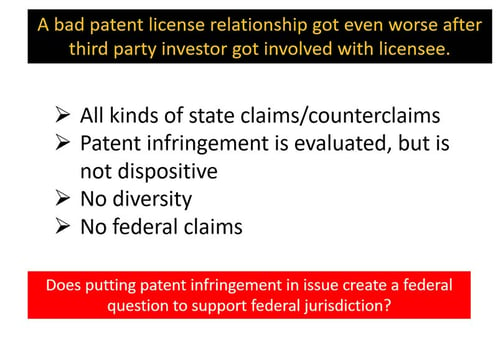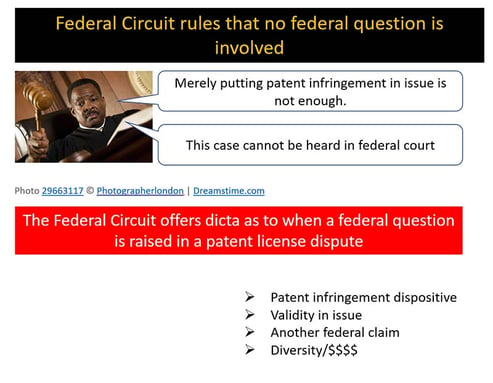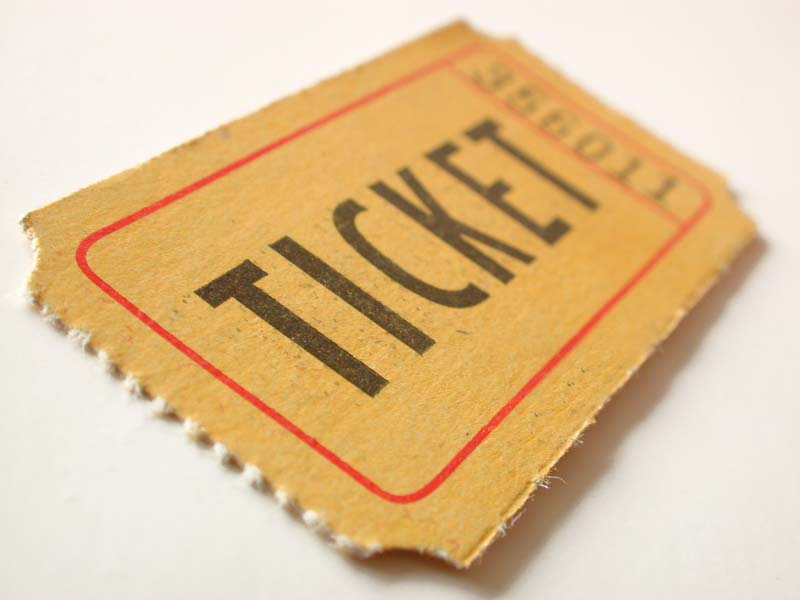Inspired Development Group v. Inspired Products Group, LLC, No. 18-1616 (Fed. Cir. 2019)
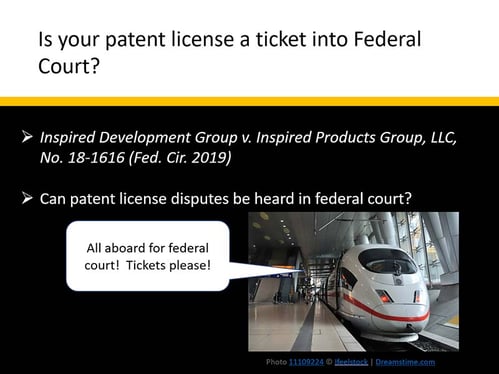 This case involved an exclusive patent license dispute. The already strained relationship between the licensor and licensee became even worse after a third party investor got involved with the licensee. Litigation erupted. All kinds of state law-based claims were asserted by both sides. No federal claims were asserted by anybody, but patent infringement would be in issue to resolve the state law claims. The parties were from the same state, so diversity of citizenship was lacking. At issue is whether a federal court has jurisdiction to adjudicate this license dispute.
This case involved an exclusive patent license dispute. The already strained relationship between the licensor and licensee became even worse after a third party investor got involved with the licensee. Litigation erupted. All kinds of state law-based claims were asserted by both sides. No federal claims were asserted by anybody, but patent infringement would be in issue to resolve the state law claims. The parties were from the same state, so diversity of citizenship was lacking. At issue is whether a federal court has jurisdiction to adjudicate this license dispute.
Federal courts have authority to adjudicate disputes either where there is diversity of citizenship or where a federal question is involved. Does the fact that the Inspired court will evaluate patent infringement create a federal question?
The Federal Circuit ruled that this dispute could not be heard in federal court. Even though patent infringement would be evaluated, infringement would not be dispositive of the outcome. There was not enough here to create a sufficient “federal question” for purposes of federal jurisdiction. The result is that patent license disputes do not get a free ticket into federal court when only state law claims are involved.
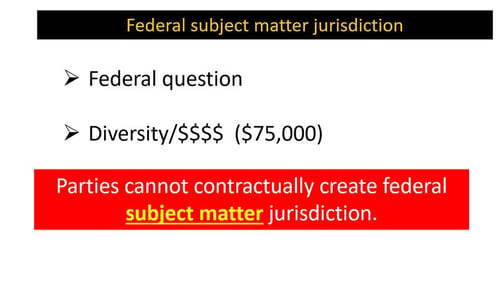 The court expressly indicated that a federal question would have been involved if the accused infringer counterclaimed seeking a federal declaratory judgment regarding noninfringement or invalidity, but no such DJ claim was asserted. The court suggested other circumstances under which the state law claims might have raised a federal question. Based on the court’s reasoning, it remains possible that a sufficient federal question could have been raised if the outcome of one or more claims necessarily depended on the infringement question. The court’s reasoning also indicates that a federal question could have been involved if validity were to have been at issue.
The court expressly indicated that a federal question would have been involved if the accused infringer counterclaimed seeking a federal declaratory judgment regarding noninfringement or invalidity, but no such DJ claim was asserted. The court suggested other circumstances under which the state law claims might have raised a federal question. Based on the court’s reasoning, it remains possible that a sufficient federal question could have been raised if the outcome of one or more claims necessarily depended on the infringement question. The court’s reasoning also indicates that a federal question could have been involved if validity were to have been at issue.
Different strategies can be used at the drafting and negotiation stage to increase the chances of having a federal court ticket down the road if a license dispute were to erupt. Recall the power of know how. Remember to include know-how in the agreement and a federal trade secret claim might be available to assert under the Federal Trade Secret Act. Perhaps the breach at issue or surrounding conduct creates a federal claim under other federal laws such as unfair competition under Section 43(a) of the Lanham Act or a federal antitrust claim. Perhaps a license can be crafted so that federal warranty claims arise under the Magnuson-Moss Act. A conventional or reverse declaratory judgment action involving infringement or validity issues also may be available. For example, it would be mainstream for the accused infringer to file a validity challenge via a federal declaratory judgment claim. Could patent owner file a reverse, federal declaratory judgment that its patent is valid to create a federal question? Inventor issues also may create a federal question. If all else fails, it often is the case that diversity of citizenship may exist in many license disputes, and the amount in dispute often is sufficient to meet the dollar threshold to access federal court. Sometimes, it may be the case that licensor’s home state court system provides a favorable venue so that state court is the place to be.
Note that the parties may not contract to consent to and thereby create federal jurisdiction. Federal jurisdiction is a limitation imposed by the U.S. Constitution. The parties cannot contractually create this authority out of thin air.
